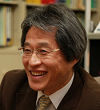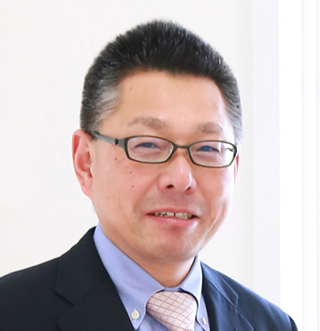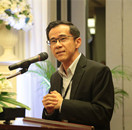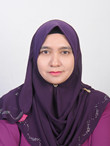 |
Prof. Akira Toriumi (IEEE Fellow)
|
Biography: Akira Toriumi
received the B.S. degree in physics, the M.S. and Ph.D. degrees
in applied physics from The University of Tokyo in Japan in
1978, 1980 and 1983, respectively. Then, he joined R&D Center of
Toshiba Corporation in Japan, in which he had been engaged in
device physics and technology in CMOS miniaturization. He was
with Massachusetts Institute of Technology, USA (1988–1990) as a
visiting scientist on leave from Toshiba. In May 2000, he moved
to Department of Materials Engineering of The University of
Tokyo. He had also served as a high-k gate stack group leader in
MIRAI Project (a national project for advanced CMOS in Japan)
from 2001 to 2007. He retired in March 2019, and he is now an
emeritus professor in The University of Tokyo.
Through his professional carrier, his research interests have
been on device physics and materials science with regard to
semiconductor devices. Particularly, he has investigated gate
dielectrics, functional oxides, electron transport and
processing science in Si and Ge CMOS, and low-dimensional
materials and devices. He has authored and co-authored more than
600 scientific journal papers and conference proceedings, and
several book chapters. He received several awards such as IEEE
International Reliability Physics Symposium (IRPS), Best Paper
Award (1997), Solid-State Device and Materials (SSDM), Best
Paper Award (2000 & 2003), IEEE EDS Paul Rappaport Award (2004),
SSDM Award (2014), IEEE Cledo Brunetti Award (2016) and JSAP
(The Japan Society of Applied Physics) Outstanding Achievement
Award (2017). He served as several international conference
chairs and committees such as Executive Committee in VLSI
Symposium (2008-2017), Program Chair (2005) and Organizing Chair
(2018) in International SSDM, General Chair in Si-Nanoelectronics
Workshop (IEEE/JSAP) (1999), Executive Committee (2004-2006) and
Vice President (2012-2013) in JSAP, Vice Chair (2010-2011) and
Chapter Chair (2012-2013) in IEEE EDS (Electron Device Society)
Japan.
 |
Prof. Frank Otremba
|
Biography: Prof. Dr. Frank Otremba is the Head of the BAM (Federal Institute for Materials Research and Testing) division “Tanks for Dangerous Goods and Accidental Mechanics” in Berlin and honorary professor at the Technical University of Brandenburg. He graduated as mechanical engineer (Dipl.-Ing.) and received his Ph.D. from the University of Rostock in the field of numerical methods and fracture mechanics in 1991. He has more than 20 years of experience in the nuclear field and has published numerous papers. He is a member of the German Reactor Safety Commission subgroup “Materials and Pressurized Components” and Nuclear Safety Standards Commission subgroup “Mechanical Components”.
 |
Prof. Yasuhiko Hayashi
|
Biography: Yasuhiko HAYASHI
received the B.E., M.E. and D.E., degrees in electrical and
computer engineering from the Nagoya Institute of Technology,
Nagoya, Japan, in 1990, 1992, and 1999, respectively. From 1992
to 1996, he was engaged in research on semiconductor device
modeling in Motorola Japan Ltd., Tokyo, Japan. He was appointed
a Research Associate and an Associated Professor in the
Department of Environmental Technology and Urban Planning at
Nagoya Institute of Technology in 1999 and 2007, respectively,
and then he was an Associated Professor in Department of
Frontier Materials at Nagoya Institute of Technology in 2008. He
has been a full Professor in Graduate School of Natural Science
and Technology at Okayama University since October 2012. Since
December 2016, Visiting Professor at Institute of Innovative
Research, Tokyo Institute of Technology. From June to November
in 2005, he was with the University of Cambridge, as a Visiting
Scientists, during which time he explored the metal filled
carbon nanotubes.
His research interests are fundamental physics, low-cost
production and applications of various types of carbon nano
materials, such as carbon nanotubes, graphene and carbon
nanohorns. And also interests are CNT yarn and senseors,
Perovskite solar cells & Thermoelectric devices, Organic solar
cells & FETs, New nanoscale devices and systems, Spintronics.

|
Prof. Pramoch Rangsunvigit
|
Biography: Pramoch Rangsunvigit is a professor in chemical engineering at The Petroleum and Petrochemical College, Chulalongkorn University, Bangkok, Thailand. He received his B.Sc from Chulalongkorn University before his Ph.D. from Texas A&M University, USA. His research interests cover conventional separation processes like adsorption and crystallisation and hybrid separation processes. Photocatalysis is also another area that he has contributed to. In addition, he has extensively worked on gas storage technologies including hydrogen storage via adsorption and metal hydrides and natural gas storage through adsorption and gas hydrates. He was awarded with outstanding teaching and research from a number of organisations.

|
Assoc. Prof. Azlin Fazlina Osman
|
Biography: Assoc. Prof. Dr Azlin Fazlina Osman obtained her PhD degree in Nanotechnology from Australian Institute for Bioengineering and Nanotechnology (AIBN), The University of Queenland, Australia. She is now an Associate Professor at the Faculty of Chemical Engineering Technology, Universiti Malaysia Perlis (UniMAP) and a Leader for Biomedical & Nanotechnology Group in Center of Excellence Geopolymer and Green Technology (CEGeoGTech), UniMAP. Her research interests are in the field of biomedical polymer, nanotechnology, nanocomposites, biocomposites and structure-property relationships of materials. She is the first author / corresponding author of several articles published in Q1 and Q2 journals, and has published more than 100 scientific papers in the field of polymer, composites, nanocomposites, nanoparticles, biocomposites, geopolymer and biomedical polymers. She is supervising more than 20 postgraduate students who are working in these particular areas and being involved in several professional memberships such as Board of Engineers Malaysia (BEM), Professional Technologist in Materials Science Technology from Malaysia Board of Technologist (MBOT) and Professional Member of Institute of Materials Malaysia (IMM).
